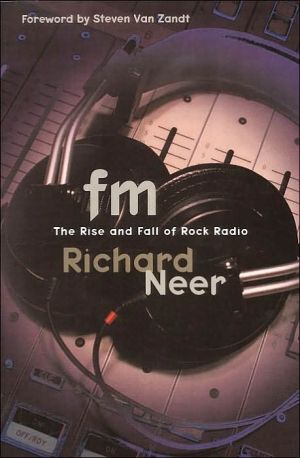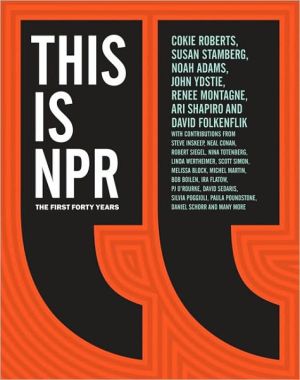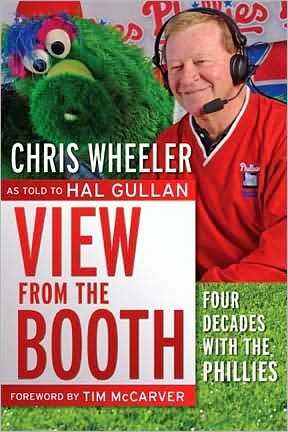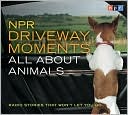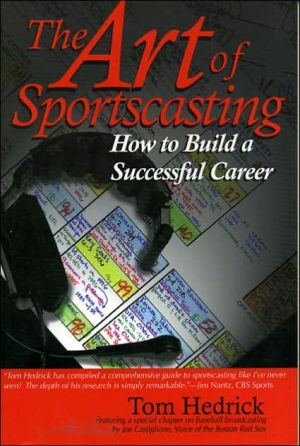FM: The Rise and Fall of Rock Radio
"It was all so honest, before the end of our collective innocence. Top Forty jocks screamed and yelled and sounded mightier than God on millions of transistor radios. But on FM radio it was all spun out for only you. On a golden web by a master weaver driven by fifty thousand magical watts of crystal clear power . . . before the days of trashy, hedonistic dumbspeak and disposable three-minute ditties . . . in the days where rock lived at many addresses in many cities."\ –from FM\ As a young...
Search in google:
"It was all so honest, before the end of our collective innocence. Top Forty jocks screamed and yelled and sounded mightier than God on millions of transistor radios. But on FM radio it was all spun out for only you. On a golden web by a master weaver driven by fifty thousand magical watts of crystal clear power . . . before the days of trashy, hedonistic dumbspeak and disposable three-minute ditties . . . in the days where rock lived at many addresses in many cities."–from FMAs a young man, Richard Neer dreamed of landing a job at WNEW in New York–one of the revolutionary FM stations across the country that were changing the face of radio by rejecting strict formatting and letting disc jockeys play whatever they wanted. He felt that when he got there, he’d have made the big time. Little did he know he’d have shaped rock history as well.FM: The Rise and Fall of Rock Radio chronicles the birth, growth, and death of free-form rock-and-roll radio through the stories of the movement’s flagship stations. In the late sixties and early seventies–at stations like KSAN in San Francisco, WBCN in Boston, WMMR in Philadelphia, KMET in Los Angeles, WNEW, and others–disc jockeys became the gatekeepers, critics, and gurus of new music. Jocks like Scott Muni, Vin Scelsa, Jonathan Schwartz, and Neer developed loyal followings and had incredible influence on their listeners and on the early careers of artists such as Bruce Springsteen, Genesis, the Cars, and many others.Full of fascinating firsthand stories, FM documents the commodification of an iconoclastic phenomenon, revealing how counterculture was coopted and consumed by the mainstream. Richard Neer was an eyewitness to, and participant in, this history. FM is the tale of his exhilarating ride. Steven Van Zandt Rock music had become my religion. Radio my church. And these DJs my priests, rabbis, and gurus. They would preach from the gospel of Dylan, Lennon and McCartney, Jagger and Richards, the Book of Townshend, the Song of the Byrds, and the Acts of Davies. The New Testament would include Procol Harum, Them, Traffic, Cream, the Jeff Beck Group, Buffalo Springfield, Jefferson Airplane, Jimi Hendrix, and Led Zeppelin. After Sgt. Pepper it was the Exodus of singles and the Revelations of albums. And we listened and listened and listened and learned. WNEW, 102.7, was our local Temple of Solomon and somehow these stations were popping up in every major city simultaneously like a planned invasion from outer space. And with them a new generation of DJs, our generation, speaking to us. Personally. Understanding as only we understood. Inspiring us, motivating us, conjuring up images and stimulating the senses as only radio can do when it is in the hands of the righteous. And then it was over.
The Promise\ I lay awake for a sunrise that never broke through the clouds. I hadn’t slept much the night before. Most of the weekend I had been awake, preparing for today—the most important day of my life—all twenty-one years of it.\ Not every day you think is going to be pivotal toward your future turns out that way. How often do life-changing days happen with no warning, no chance to prepare? An anonymous driver swerves into your lane. An unknown IRS agent decides that you are the one to be audited. The results of a PSA test come in. Or on the plus side—the lottery calls your number. A major headhunter hears from an old college chum that you are the perfect candidate to head a large corporation. The dot-com stock you buy early is unexpectedly acquired by Microsoft.\ But this Monday morning in March of 1971, I was sure that in a few hours the course of my life and that of my best friend would be changed. Michael Harrison and I lived in a small apartment above a bakery in Oceanside, Long Island, and had shared many adventures together. For the past two years, he and I had put in sixteen-hour days at WLIR-FM, a small suburban radio station. We’d slept at the station more nights than we cared to remember, sometimes because we were working late, sometimes because we had no place to live. We’d missed meals, desperately trying to make it until the next paycheck with only change in our pockets. We’d often devote hours to meticulous strategy planning, designed to convince our boss at WLIR that we merited an extra 25¢ per hour.\ We made these sacrifices for one ultimate goal: to get a job at WNEW-FM—real New York radio, with studios in Manhattan, where the stars of every type of showbiz lived and played. And now this day could be the payoff for those months of deprivation, or it could sentence us to a longer term of penance before we could deserve another shot at nirvana.\ In 1971, the absolute coolest place to work in radio was WNEW-FM. The disc jockeys had total freedom to play whatever records they chose. They could say what they wanted, whenever they wanted. They didn’t need to put on ballsy radio voices; they spoke like real people, with regional accents or immature timbres. Some were intelligent, others sexy or funny. They brought themselves to the airwaves unvarnished—what you heard was what they were.\ They made comfortable salaries, although not the megabucks of AM radio superstars. They came from different places, different experiences. Some were veterans of the Top Forty wars who’d tired of the battle, some were freshly out of college and idealistically striving to reinvent a medium that had grown old and irrelevant. A couple were entertainers from other fields who had sought to be actors or poets, but found a haven in a darkened studio behind a microphone. Some were handsome, some had been cursed with faces made for radio. But collectively, they formed a dream team that the cognoscenti acknowledged as the industry’s pinnacle. And due to a unique set of circumstances, Harrison and I had talked ourselves into believing that we were ready to join their ranks.\ We’d had two opportunities over the past year, but they’d proven ephemeral. There was our unsuccessful attempt to get to WNEW-FM through a side entrance by beseeching Metromedia Group president George Duncan for a job at one of the company’s out-of-town outlets. Duncan presided over several stations, in places like Philadelphia, Los Angeles, and San Francisco, as well as New York. We figured if we could impress the company at one of its far outposts, we might earn a ticket back to WNEW-FM within a reasonable period of time. But we’d blown the interview with Duncan.\ At the time, John Lennon had released a song called “Working Class Hero.” It was a bitter, self-deprecating view of his life and the whole idea of being known as an ex-Beatle. It contains the line, “You’re still fucking peasants as far as I can see.” Many underground stations were playing it. Some bleeped out the offending lyric, some reversed the word, and a few played it uncensored.\ The FCC was not happy with progressive radio: Richard Nixon was constantly vilified and its strident antiwar political bent chafed the administration. As we now know, the president didn’t hesitate to punish his enemies with whatever means were at his disposal. The FCC issued warnings that licenses could be at stake if lyric content was deemed objectionable—either obscene or condoning illicit activity, mainly drug use. In fear of governmental discipline, George Duncan had banned innocuous songs like Brewer and Shipley’s “One Toke over the Line,” or the Grateful Dead’s “Uncle John’s Band” (containing the phrase “Goddamn, well, I declare”). Though he could be profane himself, he didn’t want anything to endanger the Metromedia broadcast empire.\ But we weren’t aware of this conservative approach and when Duncan casually brought up “Working Class Hero,” asking how we were handling it at WLIR-FM, I blurted out, “We’re playing it uncut. Our audience deserves to hear an artist like John Lennon as he intends to be heard. And the song’s message is far from obscene.”\ The interview continued for a few minutes thereafter, but my impulsive answer troubled me the rest of the way. Duncan graciously said that changes were always happening at Metromedia, so that even though nothing was available now, he’d consider us in the future. Several months had passed and we hadn’t heard anything, so we assumed we were out of the running.\ We’d also interviewed at CBS, another company that controlled radio stations, although none so desirable as Metromedia’s stable of progressive stations. CBS held on to vestiges of conventional AM radio: a more upbeat, insincere style with music that was programmed by one director; the individual jocks holding no sway over what they played. Our strategy was to take over one of their less profitable stations and build it up to the point that Metromedia would have to take notice and hire us away.\ Those attempts had proven fruitless; we were seen as too independent to work within the buttoned-down CBS corporate structure. Harrison and I were beginning to lose faith, feeling condemned to work in radio’s hinterlands forever, never tasting the sweet freedom that WNEW-FM offered. But the preceding Friday night, we heard Rosko, the station’s star attraction, resign on the air. Bill “Rosko” Mercer was a fixture on nighttime radio in New York, a spiritual black man who read poetry and spoke eloquently against the war with words and music. At that moment, however, we put the cultural significance of his resignation aside and concentrated on what it meant to us: There was an opening at WNEW-FM! As we listened to subsequent shifts, it became apparent to us that no successor was imminent.\ So Michael and I spent the entire weekend at the WLIR studios in Hempstead, Long Island, honing audition tapes and crafting résumés for an all-out assault on New York. We planned to camp out on program director Scott Muni’s doorstep at 230 Park Avenue in Manhattan by seven that Monday morning. From there, we’d improvise our way in to plead our case. Muni is another broadcasting legend, who had worked at both WMCA and WABC, New York radio’s Top Forty giants, before alighting at WNEW-FM. He had a deep gravelly voice, and knew the Beatles personally (as well as every other top musician of the day). We feared that he’d laugh at our hubris and throw us out on our ears, but we were naïvely determined to try.\ Since our interview with George Duncan, we realized that if we were to err, it had to be on the side of conservatism. To that end, we dressed in business suits (the only ones we had, accepted in payment for an in-store appearance). Any question about “Working Class Hero” would be answered noncommittally, if at all.\ By that morning, Michael and I were fully prepared to be told that Mr. Muni had a full day scheduled: a morning meeting with Robert Plant, lunch with Eric Clapton, and dinner with Joe Cocker. But we hoped that if we were there when he first arrived, he might take pity and squeeze us in during his morning coffee. So we drove in early through the Queens-Midtown Tunnel, parked at a ridiculously expensive garage near Grand Central Station, and walked two blocks to the New York General Building, which housed WNEW-FM’s studios. There was no problem with building security: We simply walked past the guard as if we belonged and casually pressed the elevator button. But when we reached a door on the thirteenth floor that was embossed with the familiar green logo “WNEW-FM, 102.7, The New Groove,” it was firmly bolted and there appeared to be no doorbell. We knocked, but no one answered. I searched around the corridors for another entrance but found none, so we sat on the terrazzo floor and waited, nervously rehearsing our rap, trying to anticipate any eventuality.\ Two hours later, at around nine, an extremely attractive young woman passed us and inserted a key into the lock. “Excuse us, miss, I’m Richard Neer, this is Mike Harrison. We’re from WLIR and we’re here to see Scott Muni.”\ The expected response came. “Did you have an appointment?”\ “Not exactly but—”\ “No problem. Why don’t you wait in here instead of in the hall. He’ll probably be in within the hour.”\ Our jaws dropped as we followed her into the offices. We had rehearsed a response to the appointment question, but she had made it unnecessary. In fact, all our carefully planned material proved useless that day. As it turned out, she was one of two secretary/receptionists that the station employed. One worked solely for the general manager, Varner Paulsen, and our new best friend worked for program director Muni, answered the phones, and greeted visitors. In addition to being exceptionally attractive, she had an effervescent personality and spent the next hour chatting with us, interrupted only by the occasional phone call. She was younger than we were, and she gave us lots of unsolicited tidbits about the staff, to our shock and delight.\ We hadn’t planned on this briefing, but we didn’t mind listening to her stories, thinking they might come in useful during our interview with Muni. She told us of her boyfriend, with whom she was having trouble at the time. He was a musician and traveled a lot. He lived in Los Angeles and only could see her once a year when his band came to town, but they talked on the phone. And oh yes, he was married—didn’t love his wife but they had a child and he didn’t want to leave her. The oldest line in the book. I wondered why this gorgeous, intelligent woman would waste her time on a married man three thousand miles away who was obviously using her whenever his band came to New York. It seemed pretty clear to us that he probably had someone like her in several other cities, but that was something she needed to realize for herself. She swore her love for him and pledged to remain faithful. What a waste! And what a cad he was if my suspicions were true. After hearing her story, I never could listen to a Beach Boys song with Mike Love on vocals the same way.\ By the time Muni arrived, we’d swapped enough stories with her to feel like old friends, and I’m sure she lobbied for us to be granted an audience with her boss. He came in wearing a brown corduroy jacket over a short-sleeve madras shirt with the requisite faded blue jeans and cowboy boots. A saddlebag briefcase stuffed with albums and unopened mail was slung casually over his shoulder. “Scottso,” as he was known in his AM radio days, was a ruggedly handsome man, an ex-Marine with military swagger and confidence. His hero and role model was John Wayne, not exactly a popular choice given the antiwar sentiment of 1971. Muni’s bearing was similar to Wayne’s, even if his five-foot-ten stature did not quite reach that of the film legend. His hair was short and black, with long sideburns just beginning to gray—his only concession to hipness.\ “Come in, dudes,” he beckoned, after a whispered exchange with his secretary. We spent the next two hours in his office enduring the strangest job interview ever conducted. It felt as if we were interviewing him: He regaled us with tales as if we’d known him for years. We had told him that we’d caught Rosko’s last show and that we had heard some college kid from New Jersey on the overnight show, filling in. That was the plan, he told us. Jonathan Schwartz, a talented writer and raconteur, was starting as Rosko’s permanent replacement that evening, and Alison Steele, a sexy former television performer, would temporarily be doing Schwartz’s old 10 a.m. to 2 p.m. shift. There were no openings until they decided on whether the Nightbird (as Steele called herself) would fly during the day.\ We were intimidated by Muni’s reputation, but he was very kind and spoke gently with us. His disjointed phrasing was interrupted by long pauses, as if he were taking a private journey in his mind before returning to earth. At one point, he seemed distracted while intently scanning his mail. Then he yelled excitedly for the secretary to come in.\ “I’ve found a goodie. Check this out.” He pointed to an envelope and she smiled knowingly.\ “I think you’re right, Scott. Let me get you some boiling water. I think we can save that one.”\ Harrison and I were dumbfounded when we realized that Muni was perusing the mail for uncancelled stamps, steaming them off for reuse. To us, that was like discovering that Warren Buffet clipped coupons. We laughed as he proudly displayed a container holding dozens of stamps, all neatly extracted from fan letters and junk mail.\ We were able to glean that the recently departed Rosko had not been very well liked at the station. Everyone thought him to be unnecessarily confrontational and more than a trifle rude, a man who created arguments for the sheer pleasure of embarrassing his colleagues. That appraisal seemed at odds with the sensitive poet we knew from the airwaves.\ Muni often would talk about someone, only referencing them by nickname, as if we knew everyone he did. So we got juicy gossip but couldn’t tell if the subject was a rock star or someone in the mail room. There would be lulls in the conversation during which we’d be tempted to interject something about ourselves, because we weren’t sure that Muni knew who we were either. After an hour, we sensed that extending the interview further would be counterproductive, but Scottso always had another story and we couldn’t break off without appearing rude.\ Our biggest surprise came when a rotund black man wearing large glasses and an orange leisure suit walked into the room. Was this Rosko?\ “Hello, Tammy.” Muni sneered, not bothering to introduce us.\ “And who are these two gorgeous young boys, you old bug-eyed mother humper?”\ This was obviously not Rosko.\ “Shut up, you black faggot. What are you in here for, did your mother forget to wipe your bottom this morning?”\ “You leave my mother out of this, you aging, gravel-throated bag of horseshit.”\ “Why don’t you go back to your cave, you African Queen. Leave this new meat alone. They probably don’t like your queer old black bubble ass anyway.”\ This badinage went on for five minutes, each insult topping the next until “Tammy” turned up his nose and left the room. Muni rebounded as if nothing had happened.\ “Tammy,” he chuckled to himself. He acted as if such dialog was routine office chatter, and didn’t even look up to see our reaction. We’d never witnessed such an exchange, even in the movies, and we had no idea what to make of it. Was Scott Muni a racist? Was he gay?\ We later found out that “Tammy” was in fact Tom Tracy, a longtime producer, who worked on the Giants games on WNEW-AM and pro- duced the taped weekend shows and the public service programming for WNEW-FM. He and Muni were the closest of friends, each having grown up in the South with many similar experiences, albeit from a different sexual orientation. They delighted in razzing each other with the most graphically obscene language imaginable. I actually laundered the preceding exchange, because it was too crude even for me to recount.\ In our stunned silence after the “Tammy” encounter, it seemed like a natural time to close out the interview.\ “Well, Mr. Muni, we’ve taken up enough of your time. Thanks for seeing us. We brought some tapes and résumés.”\ “Don’t need ’em. Leave ’em with the girl on the way out if you want to.” It sure sounded as if we were being blown off. “We’ll be in touch.”\ Just then, Alison Steele burst into the room. “Boys, how are you?” She gave us both extravagant hugs and kisses on the lips. “Scott, I hope you’re treating my friends well. These are the nicest boys ever. Got to get back on the air. ’Bye.”\ With that, the whirlwind departed the room, sucking all the air out of it with her. We’d known Steele casually for a few months, having invited her out to WLIR for an on-air interview and then having lunch with her in the city, ostensibly seeking career advice. But we hardly expected such a ringing endorsement. We were breathless as we smiled lamely at Muni and left his office. He never called us back.\ After a week, we called him. Couldn’t take the call, our secretary friend coldly informed us. We’ll get back to you.\ Another week passed. Again no call. Again we called him.\ “Sorry, he’s in a meeting. Leave your number.” No acknowledgment of our shared intimacies.\ At that point, we were thinking of going public with the Beach Boys story, but our thoughts of vengeance soon subsided into a sad acceptance of the fact that we hadn’t measured up to New York standards, whatever they were. Were we not ready for prime time? Had someone else gotten the job? But as we listened to the station, we heard a college radio guy on overnight. We knew we were better than he was. And Alison was definitely a creature of the night. Her sensual style seemed merely an annoying distraction during the lunch hour. They couldn’t be happy with this lineup.\ One more call, a week later. We decided that this was it—if there was no response to this one, we were flogging a dead horse and it was time to move on to greener pastures. Trouble was, our pastures all seemed a wintry gray. No leads, no hope.\ This time our secretary friend seemed in a better mood. “Let me see if he’s in.” She put us on hold, displaying a coyness on the phone that belied her frankness in person. Had she unburdened herself too much during our visit and was now too embarrassed to be friendly?\ “He says ‘Can you come in tomorrow morning at ten?’ ”\ Michael was too excited to play the game of pretending to check his book. “We’ll see you at ten,” he said, hanging up before she could change her mind.\ “Wooooooo!!!” we yelped in unison. “We’re not dead yet.” And you thought Monty Python invented that line.\ The next morning, we had another shapeless session with Muni, punctuated by another visit from Tammy. We were prepared for him this time, even extending a hand and introducing ourselves to save Scott the embarrassment of having to remember our names. After Tammy left, we heard more about Muni’s radio philosophy, but were able to respond with precious little of our own. When we started to, he’d interrupt with another story and we grew frustrated by our inability to plead our case. As noon rolled around and the interview faded, it seemed obvious he wasn’t interested in us. Was he using the sessions to pick our brains about WLIR? That might have made sense if he allowed us a word edgewise. We noticed our audition tapes and résumés laying exactly where he’d placed them after our last visit, untouched. Clearly, we hadn’t made much of an impression. Even Alison was too busy to come in and say hello.\ But as we were leaving, Muni glanced at his calendar. “Our GM is away today. Could you guys come in Thursday? I’d like you to meet him.”\ A radio GM, or general manager, is the boss of all bosses at the local level. He presides over the sales manager and program director, and in most cases, his word on new hires is the final one. Michael gulped down his surprise at this bit of unexpected good news. “Sure, Mr. Muni. By the way, would you like another tape? Anything in particular you’d like us to bring?”\ “No, Fats, we have a guy out on the Island. If I need a tape, he can get it.”\ Since Michael and I each weighed no more than 170 pounds, the word “Fats” didn’t offend. This is one of Muni’s quirks: If he likes you, he calls you Fats. And his friends call him Fats. I got the feeling that he employed it like Babe Ruth used the moniker “Kid,” or “Keeyid,” as he pronounced it. Since both men were known to many more people than they could be expected to keep track of, it saved them from having to remember all those names. It had the added bonus of sounding like a term of endearment.\ He had similar nicknames for other things that the FCC demanded be kept off the radio by their more commonly used colloquialisms. He called the sex act “hooky-dooky,” an expression he picked up from a Turkish friend at Atlantic Records. He often used the term on the air to the befuddlement of many of the artists he was interviewing. He referred to male genitalia as “the little guy.” Frequently, after a particularly lighthearted lunch, he’d begin his program with a status report: “The little guy’s good today.” Whenever a particularly attractive female would pass or make a provocative remark, his comment would be: “The little guy moved.” After a while, everyone in the office understood his code words and found them amusing. But he never took the time to initiate strangers to his lingo, and they came away shaking their heads at what they perceived as this odd man. By this point in our interview process, I had given up trying to figure the method in Muni’s madness.\ Two days later, we were back in the office to meet general manager Varner Paulsen. The staff called him the “Viking,” but never to his face. He had the cold appearance and demeanor of a German U-boat commander, with thinning reddish blond hair swept across his forehead, icy blue eyes, and a weatherbeaten complexion. His diction was very precise, in fact everything he did was precise. As he curtly shook my hand, I half-expected him to click his heels.\ He spent only a few minutes with us, firing off a couple of general questions, almost as if he just wanted to hear the sound of our voices and how we put our words together. He bid us a formal farewell, sizing us up critically as he departed. I literally shivered as he left the room. Muni had another appointment and hustled us out of the office.\ On the drive back to Long Island, we were more puzzled than ever. I felt like a prospective groom meeting the bride’s family for the first time. Michael couldn’t read Paulsen, either. We didn’t hear from anyone at the station for another week and our spirits sagged again. Was this what the vetting process was like everywhere?\ Finally, the following Tuesday morning the phone rang at our apartment above the bakery. It was Muni’s secretary, asking if we could come in the next day. We’d persevered through too many unfulfilling visits with these people to get overly excited, but we didn’t think they’d make us journey all the way to Manhattan to tell us of our rejection in person. When we arrived, Muni was strangely quiet, telling us that Paulsen was on the phone and that as soon as he was finished, he wanted to see us in his office.\ Excited anticipation inspired crazy speculation. We weren’t working there, so he couldn’t fire us. Was it a setup, engineered by our boss at WLIR to test our loyalty? Was this some sort of government sting and we were about to be incarcerated for God knows what? Playing “Working Class Hero” unedited?\ Muni had told us that although Varner was a tough guy, he didn’t lack a sense of humor. He’d once received a rambling twelve-page diatribe filled with obscenities from a job applicant that finally asked for a position in the final two paragraphs. After reading it carefully and making notations, he sent it back to Scott with the inscription, “Hey, SM. This guy sniffs bicycle seats. VP.”\ Paulsen looked solemn as he motioned to two leather chairs in front of his large desk. Muni stood behind us, lurking in the background.\ “Am I correct in assuming that you two come as a package?” the Viking intoned somberly.\ We had hoped that this moment wouldn’t come, but it was like being in the foxhole alongside a buddy with a shell coming in. If it had to hit one of you . . .\ Michael recited a line we had spent hours discussing. “We prefer to work together, but neither one of us would stand in the way of the other’s opportunity.”\ “Well, our problem is this: We don’t have two full-time openings on the air. That’s why we’ve been so circumspect.” I’d have to look that one up later.\ He cleared his throat. “So here’s what we can offer. We have a morning show. We have a part-time weekend opening, amounting to two shifts weekly. And we’d couple that with the music director’s position. We’d feel comfortable offering either job to either of you, but we thought that since you seem to be more into the music side of things you, Richard, would like the MD job with the weekend shifts. And that Michael would be suited for mornings. Now the money isn’t equal, I warn you. But I’ll discuss that with each of you privately, if you wish. Or together, if you don’t have a problem with it.”\ We looked at each other. At WLIR, we’d both made the same amount. But I wasn’t about to be jealous if Harrison made more, and I hoped he felt the same. “I’ve got no problem discussing it now,” I said. Michael nodded his assent.\ “We are a little embarrassed here. I don’t know what you’re making now and when you hear our offer, you might not want the job. FM money isn’t like it is on the other side of the dial. Revenues aren’t, either. But it’s not negotiable. You’ll find I don’t start low and bid myself up. I make a fair offer, take it or leave it.”\ Oh, no. Finally, a chance for a job at WNEW-FM and we might lose money on the deal? It was costing us a lot for tolls and parking to get into the city from Long Island. Even in 1971, parking could run over sixty dollars a week. But even for less money, the chance to work there was irresistible.\ Paulsen saw the fear flash across our faces. “The music gig plus weekends pays $350 a week. The morning show $425. You boys talk it over and let us know. Scott, can I see you for a moment?” he said, leaving the room to give us privacy.\ There was little time to reflect on the inequities the offer presented. Although the seventy-five-dollar pay differential was substantial then, $350 a week was more than I’d ever hoped to make in my first big radio job. Five shows in the morning might be preferable to two programs on weekends but in 1971, mornings were the least important shift on FM radio. The music director’s position was prestigious and filled with fringe benefits, although I was unaware of how extravagant they could be at this level. Rather than coldly evaluate who was coming out ahead in this deal, I was so happy that we’d both have the opportunity to continue to work together at the station of our dreams that the call was a no-brainer.\ “Are you okay with this?” Michael asked me.\ “Are you kidding? We got it made. Let’s go for it.”\ We tried to act professionally and not too giddy as we told Paulsen of our decision to accept. He shook our hands firmly and smiled, genuinely happy for us. We might have wondered how far down on the list we were and if others had turned down the same offer, but at that moment, we were too elated to be anything but completely overjoyed. We ran to the studio to share the good news with Alison, and she congratulated us.\ “I knew you guys had it all along,” she said.\ “It would have been nice if you’d told us,” I answered.\ . . .\ In the eighties, Wall Street was where the action was. The nineties saw the rise of computers—software and the World Wide Web. At various times in the last decades of the past millennium, the glamour profession might have been professional athlete, politician, actor, rock star, TV talk show host. But I’m convinced that at the beginning of the seventies, there was no greater glory than being a disc jockey at WNEW-FM.\ At the beginning of the twenty-first century, the very idea seems laughable. Today, in terms of financial position and cultural respect, disc jockeys are on the lower deck of a sinking ship. They are generally paid modest salaries in relation to other entertainers, and are deemed as replaceable as bald tires. At the first sight of ratings trouble, they are abandoned by their corporate superiors for the next flavor of the month. Instead of creating culture, they mimic it. One radio savant recently opined that in every other phase of entertainment, a presentation is greeted with, “That’s been done before, got anything original?” In radio, it’s “Where has this succeeded before?” Uniqueness is now career poison, as in real estate, where the word “quaint” once meant charming but is now a code word for “hopelessly outdated.”\ In the early seventies, though, I couldn’t think of a more exhilarating profession. Imagine having a job that paid you handsomely for toiling but four hours a day. You got to meet every rock star in creation, usually while dining for free at sumptuous restaurants. You had primo tickets to every major concert or sporting event, paid for by others. Celebrities in all walks of life were your fans: Politicians curried your favor and athletes were thrilled to be in your presence. You got to work side-by-side with radio veterans that you grew up idolizing. Every new music release was shipped to your home address, free of charge. And if your conscience allowed, you could have a personal cadre of record promotion men slavishly devoted to your every whim.\ In your daily four hours, you were the show. The music was entirely of your own selection. You never had to play anything you didn’t love. If your mood was quiet and contemplative, you could play long sets of Joni Mitchell or Gordon Lightfoot. If you were ready to party, the entire Rolling Stones collection was at your fingertips. If you didn’t like the limits of the world’s largest music library, you were free to bring in tunes from your personal cache. Or if you had something to get off your chest, you could vent for as long as you liked. An amusing story? Fire away. Take phone calls. Play Monty Python routines. It truly was a license to thrill.\ And the ratings didn’t matter because we barely knew what they were. When the quarterly Arbitron reports were issued, we occasionally got a memo suggesting we play more familiar music. The word “familiar” was never defined, leaving it to our wide-ranging and subjective opinions—from playing the Beatles once an hour to merely avoiding the fifth-best track on the Lothar and the Hand People album. Management philosophy seemed to be simple: Hire good people and leave them alone. We had two- or three-year contracts, at yearly increases of 20 percent. Life was good.\ And then there were the other fringe benefits. Whereas it would be presumptuous to suggest that any individual had the power to make or break an artist’s career, one disc jockey could champion a favored performer and dramatically increase his or her record sales. There were almost a dozen major record labels plus a host of minor ones, each represented by two or three promotion men with credit cards. Competition for a DJ’s ear could be fierce. Legally, the inducements were simple: a lavish dinner or lunch, a show, a few drinks. Company policy set a limit on the value of personal gifts, but each Christmas, there was fine wine in wooden crates, buttery leather jackets, luggage . . . whatever was hip that year. That was usually enough to get a record at least some attention.\ Illegal inducements were readily available—drugs, prostitutes, you name it. As music director, I had the power to add a record to the studio library, which would hugely increase its airplay. I suggested individual tracks for the jocks, and if my judgment was sound, I could help push singles up the charts. My first day in the library at WNEW-FM saw a steady stream of visitors from the labels setting up lunch dates. One younger guy hung in the background until the others had left, and then surreptitiously closed the heavy steel door to the music library. From under his trench coat, he extracted a bulky package wrapped in brown craft paper and clumsily tied with cotton twine. As he unveiled his prize, I recoiled physically at the sight of a lump of marijuana large enough to intoxicate several
ForewordviiThe Promise3Who Are You?18Rock and Roll High School26Crown of Creation38FM: No Static at All44Meet the New Boss48Growin' Up56Fortunate Son61Young Man's Blues70Working Class Hero76We Built This City84Break on Through (to the Other Side)91Them Changes95Move on Up103The Lamb Lies Down on Broadway117Helter Skelter124Prove It All Night133Dirty Water142The End of the Innocence146I Am the Walrus151Hotel California157Band of Gypsies166When We Was Fab172Magic Man177Good-bye Yellow Brick Road187Thunder Road191Nightbird Flying204L.A. Woman210I Didn't Expect the Spanish Inquisition219Love over Gold227Eve of Destruction234My Aim Is True245Across the Universe258I Love L.A.265Badlands269Highway to Hell281Where the Streets Have No Name289The Long and Winding Road298One Step Up, Two Steps Back324Get Back (to Where We Once Belonged)333Photograph342Index351
\ From Barnes & NobleThe Barnes & Noble Review\ Radio veteran Richard Neer's FM is a journey through the history of rock-'n'-roll radio. As he recounts his own broadcasting career, Neer simultaneously traces the development, heyday, and eventual demise of free-form radio. He chronicles the legendary deejays at pioneering rock stations such as WNEW, KSAN, and WFMU, who brought both politics and exciting, undiscovered music to listeners across the country during the 1960s and '70s. \ Neer got his start at a college station on Long Island, then moved up to the small classics station WLIR, where he and his pal Mike Harrison dreamed of working in the big city for the free-form station WNEW. Neer provides a crash course for readers in the basics of free-form radio, a unique format that encouraged deejays to choose the records they played on the air -- a concept that seems strange in the light of contemporary radio and its focus on the hits. But free-form radio was a flourishing, vital format during the late '60s and the '70s -- until the big corporations that owned the stations shut it down. Seeking increased ratings and revenue, management gradually introduced more and more rules in an attempt to tame the deejays, who were accustomed to selecting their own offbeat records for airplay. Neer describes the epic battles fought between hot-tempered deejays and hopelessly mainstream consultants brought in to raise the ratings. WNEW deejay Vin Scelsa, who got his start at the communal, wildly free-spirited college station WFMU, resigned almost weekly over limitations being placed on his music choices.\ Along with Scelsa, Neer worked alongside many radio icons at WNEW -- including Scott Muni, Alison Steele, Pete Fornatale, and Dennis Elsas. Neer shares many personal anecdotes about his coworkers, but the strength of his convictions and the quality of his writing prevents FM from becoming a gossipy tell-all. Although wildly different in personal taste, all of the WNEW deejays shared a common passion for the music. Music was an integral part of the vibrant new youth culture that swept the country in the mid- to late '60s, and emerging FM stations like WNEW played a big part in bringing new musicians to the public. WABC was one of the first to heavily promote the Beatles when they first appeared in the States, and WNEW itself played a role in introducing Bruce Springsteen to a wider audience, broadcasting an early concert live from The Bottom Line in Greenwich Village.\ The conflicts described in Neer's book -- individuality versus corporate culture, integrity versus ratings -- reflect such central themes in American culture that FM can be seen as an allegory for many media industries. Neer balances this aspect of FM with the personal, unique stories of the deejays, program directors, and musicians, making this the definitive book on rock radio history. (Julie Carr)\ \ \ \ \ \ Steven Van ZandtRock music had become my religion. Radio my church. And these DJs my priests, rabbis, and gurus. They would preach from the gospel of Dylan, Lennon and McCartney, Jagger and Richards, the Book of Townshend, the Song of the Byrds, and the Acts of Davies. The New Testament would include Procol Harum, Them, Traffic, Cream, the Jeff Beck Group, Buffalo Springfield, Jefferson Airplane, Jimi Hendrix, and Led Zeppelin. After Sgt. Pepper it was the Exodus of singles and the Revelations of albums. And we listened and listened and listened and learned. WNEW, 102.7, was our local Temple of Solomon and somehow these stations were popping up in every major city simultaneously like a planned invasion from outer space. And with them a new generation of DJs, our generation, speaking to us. Personally. Understanding as only we understood. Inspiring us, motivating us, conjuring up images and stimulating the senses as only radio can do when it is in the hands of the righteous. And then it was over.\ \ \ Publishers WeeklyIn 1979, the Ramones declared the end of the century. To many music insiders, this proclamation rang true: Rock and roll radio or free-form FM that allowed DJs to select music was dead, so there was no sense in dragging out the 20th century when it had already crested. Born after an FCC ruling in 1964, free form was never as "free" as it sounded. In this affably told history of music freaks vs. corporate monsters, Neer reveals that FM was a doomed marriage of commerce and creativity. In fact, FM was molded into a competitor of jingle- and single-heavy top-40 AM radio. Suddenly, there was pressure on musicians to craft quality albums (take the Beatles' Sergeant Pepper's Lonely Hearts Club Band), as DJs (like Murray the K) sometimes played entire sides to compensate for the lack of advertising. First a jock at an AM college station, Neer went on to land a program directorship at New York's WNEW-FM. His 30 years there inform the bulk of the narrative, though glimpses into the evolution of other New York and West Coast power stations are offered. Readers will get an inside, but not necessarily enthralling, view of the legendary station owners and managers, jocks and rock stars of the free form era. It's important that this story be told, but Neer's voice doesn't come across compellingly on paper. (Sept.) Copyright 2001 Cahners Business Information.\ \ \ \ \ Library JournalNeer began his career in professional radio during that brief, shining moment in radio history between the late Sixties and early Seventies that saw the rise of FM and "free form" radio. Much like Michael Keith's collection of oral histories, Voices in the Purple Haze: Underground Radio and the Sixties (Praeger, 1997), this work is not a definitive overview of the birth of FM radio or of free-form radio itself but is rather an entertaining, informative memoir focusing primarily on the author's experiences at WNEW-FM in New York. (Related activity at other New York-area stations and at a few West Coast stations is discussed as well.) Brief accounts of appropriate historical background are included. The countless personal anecdotes and tricks of the trade more than make up for the uneven coverage and the confusing time sequencing of chapters. This book will undoubtedly be of great interest to those seeking to break into big-time radio, particularly alternative stations, as some things never change. For larger public libraries and academic libraries supporting broadcasting programs. Angela Weiler, SUNY at Morrisville Lib. Copyright 2001 Cahners Business Information.\ \ \ \ \ Kirkus ReviewsA warmhearted memoir-cum-history of rock 'n' roll radio's glory days. Neer, a New York-area broadcast veteran, was fortunate to begin his career just before simultaneous explosions in the national counterculture and in FM radio's commercial potential. (His techie-oriented tangents explain how "frequency modulation" broadcasting with superior sound quality, available for decades, was shunted aside so that companies like RCA could maintain their AM-based monopolies.) "In 1966," he writes, "free-form radio was in its infancy on commercial airwaves." While the payola scandals of the 1950s had hobbled the earliest rock DJs, the low expectations of corporate license owners for their nascent FM subdivisions fueled a brief, ultra-subversive era in which the antics of low-budget stations like the infamous WFMU stoked competition among corporate-owned, Manhattan-based competitors WPLJ and WNEW (Neer's home). Neer depicts with nostalgic relish the glory days of free-form radio (through approximately 1980), which coincided with the prime years for what's now considered "classic rock." Because FM radio support was then essential to "breaking" records, DJs like Scott Muni, Pete Fornatele, Vin Scelsa, and Neer himself enjoyed substantial clout in the industry and palled around with groundbreaking musicians from Bruce Springsteen to Gene Simmons. (The celebrity anecdotes-George Harrison turning his home into a hostel for stranded DJs, Elton John's salacious on-air improvisations-offer some funny moments.) Later, he maintains a cold restraint in detailing the short-sighted, bean-counting programming strategies handed down by broadcasting conglomerates that grew powerful thanks to 1980s deregulation.Companies like Infinity first revoked the DJs' prized creative autonomy, then tinkered endlessly with tightly circumscribed formats, alienating listeners. Ultimately, Neer's generation of pioneering jocks were fired en masse in the 1990s, as WNEW pursued a ridiculous "half-alternative, half-classic" format that sounded its death knell. A good sense of the rock and radio personalities of the era, though Neer's surfeit of detail may turn off all but the truly obsessive.\ \
